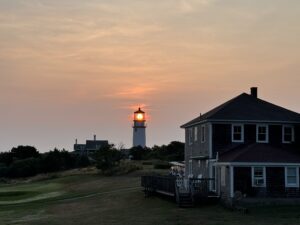PROVINCETOWN — Residents and visitors to the Outer Cape spent nearly five days last week under a hazy, gray-brown sky that dimmed the Sun and tinted it orange and red. The unusual sky, which lasted from Tuesday, Aug. 13 to Sunday, Aug. 18, was caused by wildfire smoke from northwestern Canada.

The smoke arrived on prevailing westerly winds and settled across the Northeast, causing air quality ratings to drop. As catastrophic wildfires in the Western U.S. and Canada have increased in frequency and severity, smoky days in the Northeast are becoming more common.
“These are fires that can cover tens of thousands of acres,” said meteorologist Phil Burt, who runs the website Cape Cod Weather. Fires of that size can send smoke as high as the jet stream, a band of strong winds in the upper atmosphere that typically blows west to east, driven by the rotation of the Earth.
When smoke enters the jet stream, it moves “the same way clouds move,” Burt said. Wildfire smoke can travel as far as the Eastern seaboard and sometimes even across the Atlantic to Europe.
Strictly speaking, smoke from distant wildfires reaching the East Coast is not a new phenomenon — on May 19, 1780, smoke from an Ontario wildfire mixed with thick fog and cloud cover in an event that came to be called “New England’s Dark Day.” But such events were historically rare.
Now, wildfire smoke is an annual event in New England. The smoky days this August were preceded by a much more serious incident in June 2023, when fires in Quebec caused New York City to briefly have the worst air quality of any major city in the world.
There were other significant smoke events in September 2022, July 2021, and September 2020. “It’s definitely worse now than it’s ever been,” said Burt.
Last week’s smoke drove a drop in air quality ratings across Massachusetts. On Thursday, Aug. 15, the Mass. Dept. of Environmental Protection issued air quality alerts for the five westernmost counties in the state. In June 2023, the whole state was put on alert.

According to Dr. Damian Archer, CEO of Outer Cape Health Services, poor air quality can have significant health effects, particularly for the elderly, the very young, and people with asthma and emphysema. “People have to consider their own risk factors,” he said, and decide how much time to spend outside or whether to wear a mask outdoors.
Many of the symptoms of wildfire smoke exposure are common to other ailments, Archer said, so it is difficult to tell whether people who checked into Outer Cape Health Services during smoky episodes did so because of smoke exposure. The clinics did not see an increase in patients during the 2023 or 2024 smoke events, he said.
According to the Environmental Protection Agency, short-term exposure to smoke can lead to coughing, wheezing, and difficulty breathing as well as increased risk of heart attack and stroke. Long-term exposure to wildfire smoke can have greater effects on lung function.
Models indicate that climate change is driving the increase in wildfire activity. A 2023 study by scientists from Argonne National Laboratory, the Desert Research Institute, and the University of Wisconsin-Madison projected that extreme wildfire risk will increase by an average of 10 days per year across the country, with Texas, Oklahoma, and Kansas seeing an additional 40 days of extreme wildfire danger per year.
This increase in wildfires will mean more smoky days in the East. A 2024 analysis by First Street Foundation, a climate research group, found that air pollution will increase by 50 percent across the country by 2054, largely due to wildfire smoke. This increase would erase 20 years of progress under the Clean Air Act, the authors wrote.
Western cities including Seattle, San Francisco, and Sacramento will bear the brunt of the impact, according to First Street Foundation. The Quebec fires show that Eastern locales are not immune to serious degradation in air quality, however.
Archer said that Cape Cod has mostly had to face “blips” of poor air quality that happen once or twice a year. “It will be very different if it’s something that happens all summer,” Archer said.



